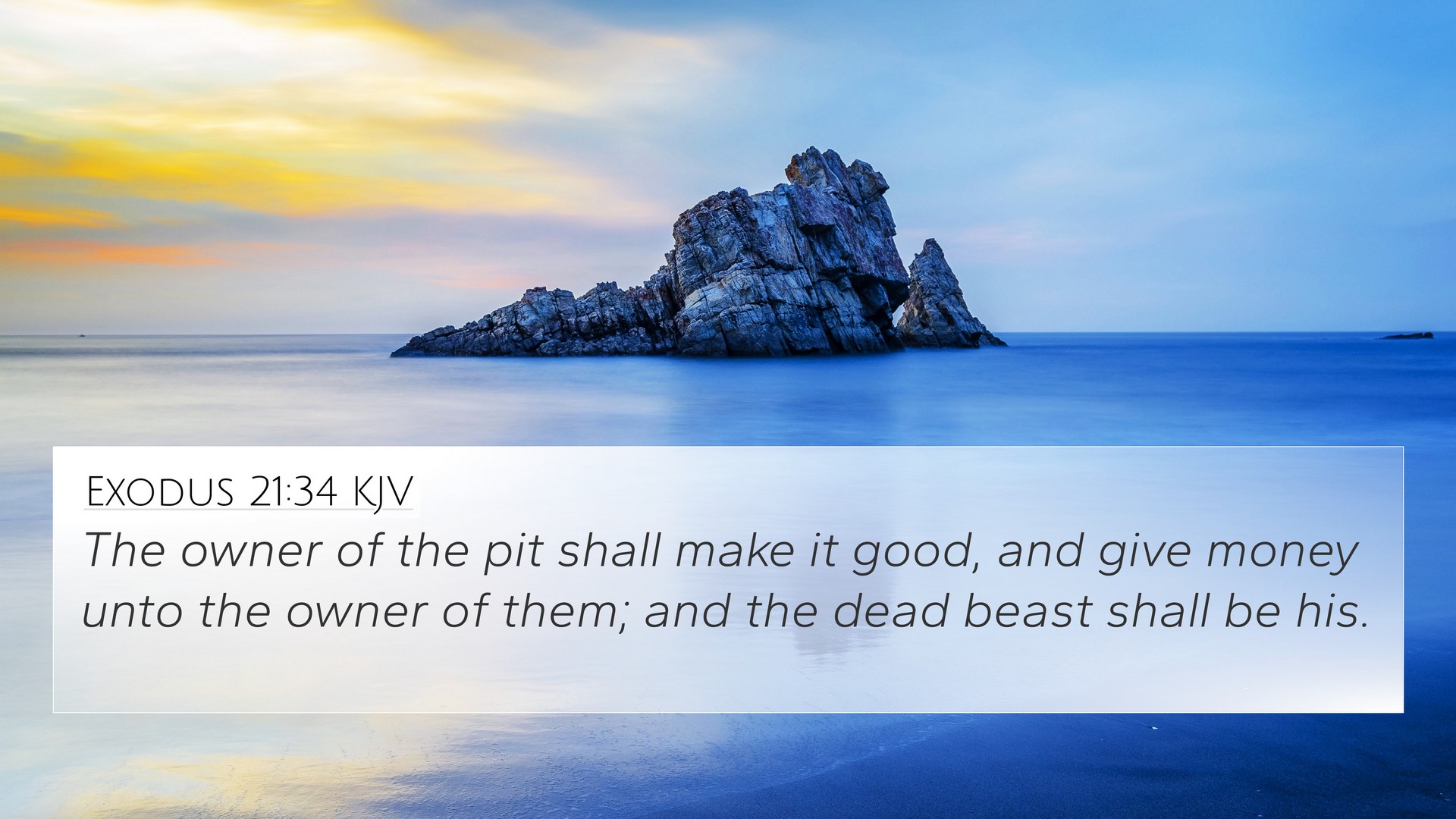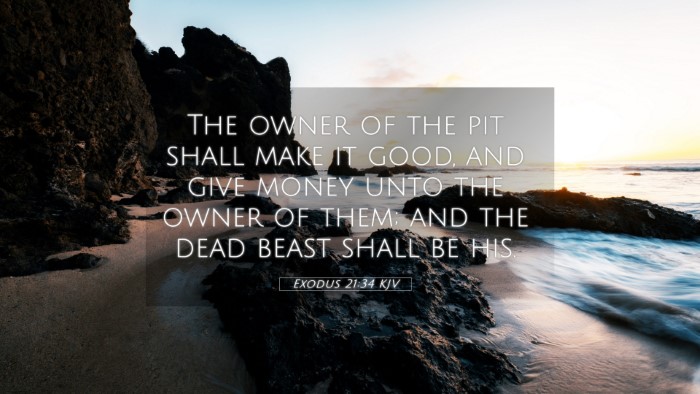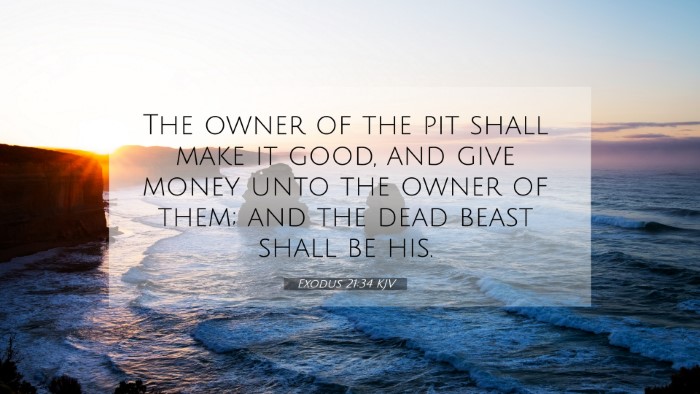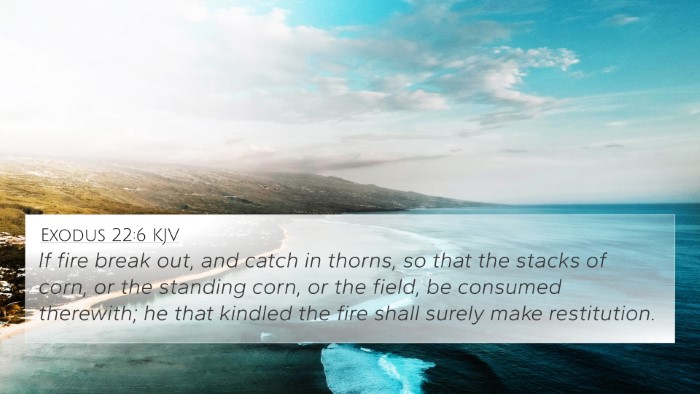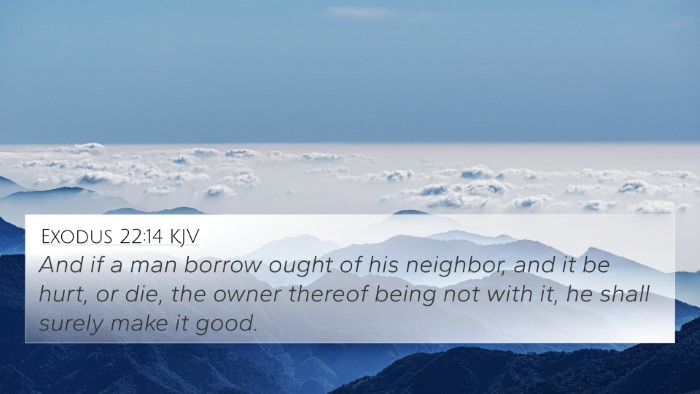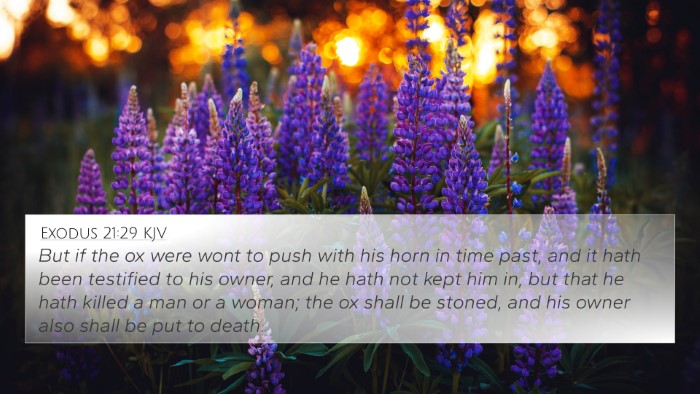Understanding Exodus 21:34
Exodus 21:34 states: "The owner of the pit shall make it good, and give money unto the owner of them; and the dead beast shall be his." This verse addresses the responsibility of an owner who possesses a pit that causes the death of another person's cattle. The scripture emphasizes accountability and restitution, reflecting on the broader themes of justice and property rights in biblical law.
Summary of Insights from Public Domain Commentaries
In examining Exodus 21:34, we draw insights from noted biblical commentators: Matthew Henry, Albert Barnes, and Adam Clarke.
-
Matthew Henry:
Henry notes that this verse emphasizes the moral obligation of individuals to ensure that their possessions do not cause harm to others. The principle laid out here speaks to a larger ethical framework where individuals are accountable for their personal property and its potential dangers.
-
Albert Barnes:
Barnes elaborates on the cultural context of this law, indicating that such statutes were vital for maintaining order and fairness in society. The law indicates not just the owner's responsibility but also the need for proper compensation to the affected party, which further reinforces the biblical theme of justice.
-
Adam Clarke:
Clarke comments on the implications of ownership and guardianship inherent within the text. The responsibility for loss incurred due to negligence calls for a practice of vigilance among property owners, promoting responsibility in societal interactions.
Thematic Connections and Cross-Referencing
Exodus 21:34 illustrates critical concepts that can be observed throughout the scriptures. Below are thematic connections and cross-references related to this verse:
- Leviticus 24:18: Deals with similar themes of restitution and compensation for damages caused by one's animals.
- Deuteronomy 22:1-3: Advocates for restoring lost property and defines the moral obligation toward one’s neighbor.
- Proverbs 6:30-31: Discusses the consequences of stealing and the necessity of restitution, aligning with the values of accountability in Exodus 21:34.
- Job 24:2: Reflects on the idea of accountability in economic relationships, echoing the sentiments found in Exodus.
- Matthew 7:12: The Golden Rule, “Do unto others as you would have them do unto you,” resonates with the principles outlined in this commandment.
- Luke 19:8: The act of restitution by Zaccheus reinforces the biblical commitment toward making amends for wrongs.
- Romans 13:10: Affirms that love is the fulfillment of the law, connecting to the need for just behavior toward others in Exodus.
Comparative Bible Verse Analysis
In a comparative study of related scriptures, we find several parallels that expand on the themes covered in Exodus 21:34:
- Connections between Old and New Testament: The laws concerning personal accountability and restitution in the Old Testament find echoes in the New Testament principles of love and ethics in interaction.
- Cross-referencing Biblical texts: Identifying links between Exodus 21:34 and subsequent New Testament teachings enhances our understanding of the continuity of biblical law and moral principles.
- Thematic Bible verse connections: The concept of restitution is not merely legal but also deeply ethical, stemming from a foundational understanding of love for one’s neighbor.
Tools for Bible Cross-Referencing
Utilizing a bible concordance or a bible cross-reference guide can greatly aid in studying connections between verses. These resources highlight direct relationships and thematic links, enhancing comprehension. Additionally, employing cross-referencing Bible study methods can facilitate deeper insights into the texts.
User Intent Keywords
Understanding how Exodus 21:34 connects to other scriptures can aid in sermon preparation or personal study. Users might ask:
- What verses are related to Exodus 21:34?
- Find cross-references for Exodus 21:34.
- How do Exodus 21:34 and Leviticus 24:18 connect?
Conclusion
In conclusion, Exodus 21:34 can be understood as a vital link in the larger discourse on justice, responsibility, and community ethics as outlined throughout the Bible. By exploring its cross-references and thematic connections, we gain a richer understanding of the moral imperatives that govern human relationships.
